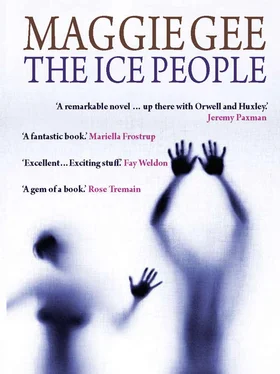‘You’re kidding,’ he said, and laughed exultantly.
‘No, really,’ I said. ‘I think they were called ‘‘Doves’’. Shall we buy one for Mummy?’
‘What’s that?’ sniffed Sarah, sweeping in at top speed with a bottle of bleach. ‘What are you going to buy for me? You forgot to remind me about your birthday.’ (She must have felt guilty for forgetting my birthday.) ‘This place is unbelievable. I don’t see how anyone can live like this.’
‘Well, you don’t live here any more. Do you?’
‘I didn’t say that,’ she said, uncertain, which told me that something might have gone wrong.
‘Mum said we were going to live with ladies,’ Luke said.
‘Shut up,’ said Sarah fiercely. ‘Go and unpack.’
‘Shut up is rude.’ Happily selfrighteous, Luke hugged me tightly. ‘But she’s quarrelled with the ladies,’ he finished.
‘You’re welcome to sleep here, of course,’ I said. A tiny blip of happiness formed itself somewhere. I decided not to press home my advantage. ‘Will you be staying long?’ I called after her, as she started to bash things about in the bathroom.
‘I live here, don’t I? We never moved out. But this, it’s dis gus ting, it’s worse than I’ve ever … ’ Her voice was muffled by the sound of something falling. I realised the curtainrail had fallen on her head. I had meant to mend it; I’d been too depressed. But then, it was Sarah who had depressed me. I decided not to apologise.
She reappeared like an angry queen bee, the blue flowered curtains draped round her neck. ‘Why are you sleeping on the sofa?’ she said. ‘Have you turned back into a student again? You have no idea how odd it looks. And by the way, what on earth are you wearing?’
(From the hall, Luke put in ‘Daddy’s dressing up.’)
People with showercurtains round their neck should not throw stones, but nothing stopped her. ‘You look pretty silly yourself,’ I jeered. She looked at me with an attempt at scorn. I so much didn’t want us to quarrel. ‘Sarah, let’s not have an argument. It’s great to see you. I hope you’ll stay.’ She paused in her rampage; her expression softened, and I pressed on. ‘I do miss you. I have missed you. And Luke. Badly.’ Perhaps I should have left it at that, but she’d made me suffer, I’d pined, without them, I was her husband, I had been wronged — ‘He needs his father. Boys need their fathers.’
‘Rubbish,’ she said. ‘It’s been disproved.’
(Did I look like a father, in my orange lycra?) ‘Disproved by what?’
‘Studies.’
‘What studies?’
‘I’m not going to argue with you, Saul. You’repickingafightbecausetheflatisdisgustingandyoufeelguiltybutwon’tadmitit.’ She said that last sentence in less than half a second.
The nerve of the woman! The outright nerve! ‘This is nothing to do with the flat,’ I said mildly. ‘I didn’t mind it the way it was, but if you don’t agree, just clean it.’ I had never tried this tack before. It made me feel calm and surprisingly powerful.
By now she was armed with a forest of brushes. ‘I can’t be expected —’ she shrieked, automatically, peering at me over the head of a broom, when her voice failed, simply trailed away, as she looked at something just over my shoulder, and I turned, rather stiffly and painfully because the sofa had twisted my neck, to see.
Luke.
Standing in the window, the curtains open, the window open. We were four floors above the ground.
My son’s thin body outlined against blue sky, the soft shocking texture of the sky without glass, fragile as a spider in the terrible sunlight. He said, in a brave voice, much too high, ‘If you’re going to have a row, I’ll jump. I can’t bear it. I’m going to jump.’
Then everything went into slow motion, as we tried very hard to do the right thing. Sarah put down her brushes, one by one. ‘Darling —’ we said gently, with almost one voice. We bore down on him, excruciatingly slowly, afraid to upset or startle him.
‘We’re not having a row. See?’ said Sarah, putting a shaking hand on my arm.
‘Of course we’re not,’ I corroborated.
‘You were,’ said Luke, and he suddenly crouched down, so quickly that we both gasped with fear, but he had just gone into a foetal position, shivering and staring at us silently. I moved another metre, then grabbed him in my arms (surely he shouldn’t be so light, at seven?), while Sarah banged the window shut with desperate force, and said, ‘Sorry, Sorry .’
I sat down with Luke on the sofa, and wrapped him in the blanket I’d been sleeping under. I held him until he stopped shaking and crying. ‘Mummy and I are so sorry,’ I said. ‘We weren’t really rowing. It was just about the cleaning. Not important. Silly old cleaning.’
‘You always row about cleaning,’ he said. ‘That’s why I don’t want to be alive any more. I’ll go somewhere else. I’ll get away. I’ll go to heaven and live with Grandpa.’
It was so absolutely shocking to hear a child say that. I hoped his mother was listening.
She was. She came and sat beside us on the floor, her crimson head upon her crimsontipped hands, but when she looked up she was white as death, whiter than Luke, if that were possible. She reached out and patted Luke’s ankle. ‘I promise not to row with Dad any more. I’m … really sorry. It’s been a bad day.’ Then she took my hand, stroking it with one finger. ‘Sorry, Saul.’
‘So I should hope.’
Luke saw my smile, and began to relax. He contrived a position where he could hug us both. ‘I like it like this,’ he announced. He was quick to appreciate a position of strength. ‘Can we have hot chocolate, Mummy? And biscuits? Can we all sleep in the same bed tonight?’
‘Yes,’ said Sarah, ‘Yes, my love,’ though she usually said ‘no’ to requests for chocolate. She got up to see to it, leaving us together.
‘Will she keep her promise?’ Luke asked in a whisper.
‘I think so. But never do that again.’ I was remembering what happened after he was born, how the doctors claimed Sarah was suicidal. Perhaps it was genetic. (Or was it me? Perhaps I drove everyone near me to suicide.)
She came in smiling with mugs on a tray and a plate of chocolate biscuits. But old habits die hard. ‘There’s only one plate. Try not to drop crumbs.’
Something occurred to Luke. ‘Daddy!’ he cried, so sharply that I slopped my drink again. Sarah noticed but managed to say nothing. ‘Tell Mummy you’re going to buy her a robot.’
‘What?’ she asked.
I told her as much as I could remember about the Doves. They were dogsized or toddlersized, like household pets. They looked vaguely like stumpy winged birds, but the TV camera hadn’t lingered long enough for me to tell. They could dust, wash floors, recycle rubbish … And the cost was pitched low enough for everyone to buy one (the Outsiders could never have afforded them, of course, but then, they had no homes to clean). No more than the cost of a cheap car. I remembered the slogan: ‘A Dove in Every Home.’
‘Giant publicity campaign, huh?’ was her first remark, made without enthusiasm.
‘Well, they did look — remarkable. I really would like to buy you one.’
‘What do you mean, buy me one? Buy us one. It would be cleaning for both of us. Cleaning is as much your work as mine.’
Feminism can be fucking pedantic, though my heart leapt up at that ‘both of us’. Still, I took her words as a ‘Yes’. ‘Mummy says ‘‘Yes’,’ I said to Luke, and he beamed hugely, showing straight white teeth. His front teeth had grown down while they were away, and his face was longer, more adult, but also more piercingly vulnerable. ‘I’m going to buy us a Dove, Lukey. Our own robot. You can play with it.’
Читать дальше












